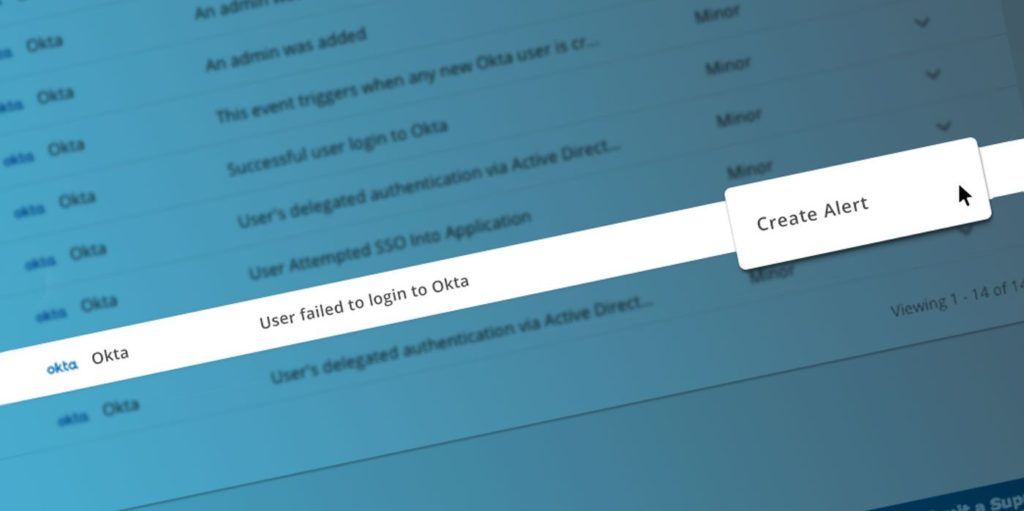Taming SaaS Security Challenges with the Zero Trust Security Model
Today, the new reality is that network-based security is no longer adequate. Companies need to invest in a new security architecture to effectively manage their sprawling SaaS portfolio. Enter: Zero Trust. Part one of our blog series explores why a new security framework is essential right now.
6 Takeaways from Altitude 2018
Last week, we hosted Altitude, our annual customer summit, in Denver, Colorado. It was our best customer summit yet, with over 140 IT and security professionals attending. Thirty speakers from all over the country gave insights and tips on security automation, SaaS management efficiency, and the future of IT and technology. Missed it? No worries. Here are six key takeaways from the conference.
Activity-based Alerts: Giving IT More Granularity and Control
You spoke, we listened. At our annual customer conference last year, the number one feature you requested was activity-based alerts. These are alerts for things like suspicious user logins or the downloading of confidential files. So we built it. So far we’ve released alerts for Okta, Dropbox, and G Suite, with more on the way for Box, Salesforce, and Microsoft. Activity-based alerts are the next frontier for companies securing mission critical SaaS apps. Here’s how they give IT more control and insights than ever before.
Modernizing IT with Cloud Native Patterns – Part 3
Chris Borte, director of information technology at InsideTrack, made it a priority to develop an IT infrastructure that would be impervious to ransomware. The answer? Cloud native architecture. In this final installment of our blog series on the advantages of going cloud native, he offers guidance for organizations that are ready to modernize their IT system and go cloud native. Here are his essential tips on how to get started.
Modernizing IT with Cloud Native Patterns – Part 2
Yesterday we kicked off our 3-part blog series on cloud native architecture. We continue today with Part 2, which discusses additional advantages of going cloud native. This post dives into laptop management patterns, loose coupling, SSO as a default, self-service, and collaboration. Here’s what you need to know.
Modernizing IT with Cloud Native Patterns – Part 1
How do you develop an IT infrastructure that’s impervious to ransomware? As InsideTrack’s director of information technology, Chris Borte had a solution: move InsideTrack to a cloud native architecture that not only secures the network but also enhances flexibility and productivity. In this 3-part series, he discusses the advantages of going cloud native and offers tips for organizations that are ready to modernize their IT system. Part 1 explores the term “cloud native” and zero trust network architecture.
MDM Tamed the Explosion of Mobile Devices. But What About SaaS?
The lessons learned from MDM adoption can serve as a predictor for the gifts and challenges of SaaS in today’s workforce. We’re at a tipping point right now with SaaS management, and if history is any indication, we know how this story will play out.
A Better Way to Manage Multiple SaaS Apps (Featuring New Recommendations from 451 Research)
Managing multiple SaaS applications is creating unprecedented risk and challenges for IT organizations. Enter: SaaS Operations Management (SOM), a new market that solves those challenges. 451 Research Principal Analyst Carl Lehmann recently hosted a webinar where he explained the high value of SOM, how it’s unique, and why companies need to start paying closer attention to it. Here’s a recap.
What No One Tells You About Managing SaaS Environments: 6 Guiding Principles for IT Success
There’s a lot that nobody tells you about SaaS management… like how it’s impossible to manage data sprawled across dozens of apps. Or that manual, repetitive tasks will take up most your day (and crush your soul). We recently hosted a webinar on all the best practices and guiding principles you should know but nobody tells you about. Here’s a recap.
Think GDPR Only Means Reporting Data Breaches Within 72 Hours? Think Again
While GDPR does require you to report a data breach within 72 hours, that’s not the only rule IT needs to be aware of. GDPR also involves the newly defined role of a Data Protection Officer (do you need to appoint one?), and new responsibilities for data controllers vs. data processors (which one are you?). Find out the answers in this post. Plus, we’re including a 10-step checklist to get you jump-started on your path to GDPR compliance.












